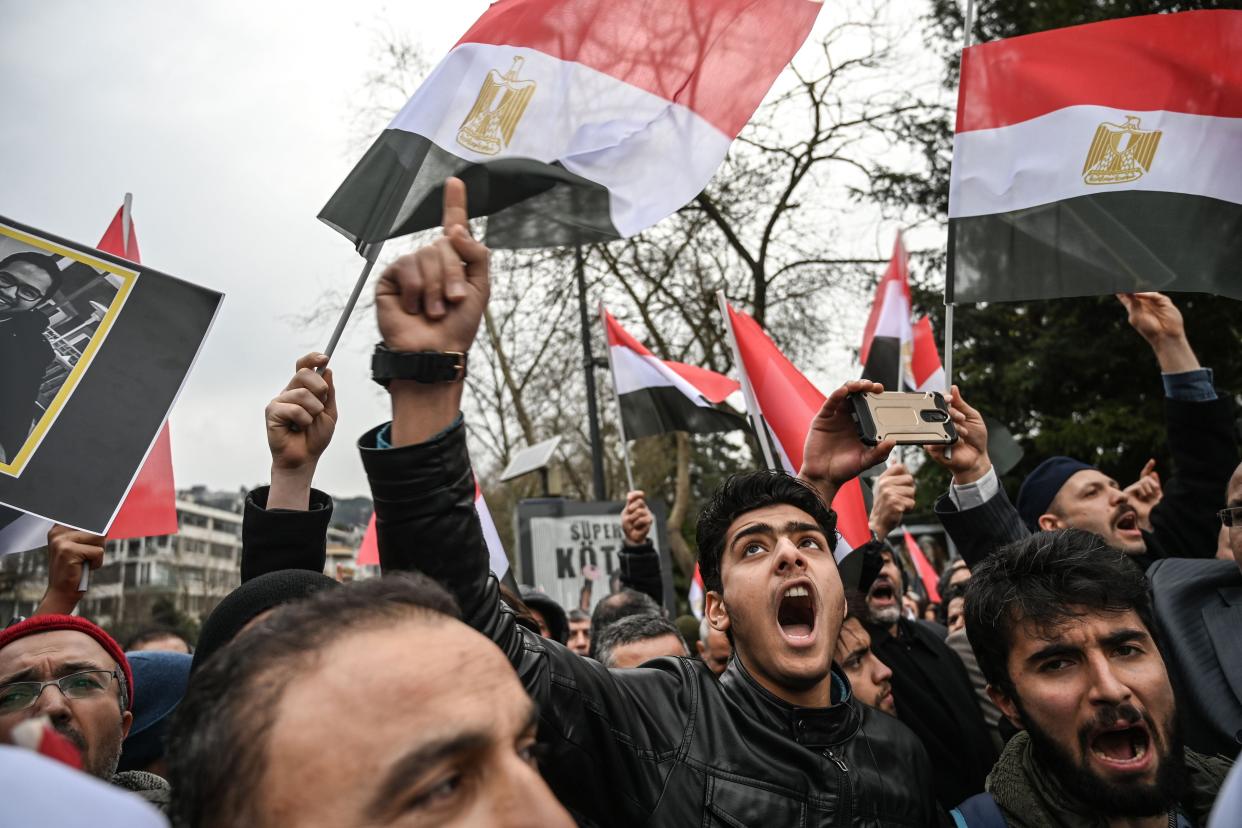Egypt carries out ‘horrifying execution spree’, killing dozens in just two months

Crowds demonstrate against the death penalty in Egypt
(AFP via Getty Images)Egypt has carried out a “horrifying execution spree”, killing nearly 60 men and women over the last two months alone – double the number recorded for the whole of 2019, according to Amnesty International.
Amnesty said the surge in death sentences, many of which relied on confessions extracted by torture, comes amid an escalating crackdown against rights groups working to stop the use of the death penalty.
Three staffers at the Egyptian Initiative for Personal Rights (EIPR) were recently arrested on terrorism charges and remain behind bars in pre-trial detention. The prominent organisation had released a report just last month documenting the alarming rise in executions.
Amnesty said that they were able to confirm at least 57 executions in October and November, nearly double the recorded 32 people executed through the whole of last year.
This number is likely an underestimate as the Egyptian authorities do not publish statistics on executions or those on death row, forcing rights groups to rely on testimonies from relatives of those executed, their lawyers, as well as news and social media reports.
Pro-government media in Egypt reported an additional 34 people were executed during the same time period, which Amnesty could not independently verify, meaning the true death toll could be as high as 91.
“The Egyptian authorities have embarked on a horrifying execution spree in recent months, putting scores of people to death, in some cases following grossly unfair mass trials,” said Philip Luther, Amnesty Middle East and North Africa research and advocacy director.
“These executions are particularly appalling given the well documented and systematic breaches of fair trial rights in Egypt, with courts often relying on torture-tainted ‘confessions’,” he added.
Among those on death row is a monk convicted of killing a bishop in 2018 after what the group described as a “grossly unfair trial” that relied on forced confessions.
The Egyptian authorities have brutally cracked down on dissent since the 2013 military overthrow of unpopular – but first democratically elected – Muslim Brotherhood president Mohamed Morsi.
Since then hundreds of people were killed as protest camps were forcibly and violently dispersed, and tens of thousands of people arrested.
Torture is rampant in Egypt’s detention centres and prisons, and often used to extract forced confessions, Amnesty found.
The group said 10 men executed on 4 October, who were sentenced to death in a case involving violent attacks on officials and public property, had likely been subjected to enforced disappearance and torture.
These executions are particularly appalling given the well documented and systematic breaches of fair trial rights in Egypt, with courts often relying on torture-tainted ‘confessions’
One of the men executed, Gamal Zaki, even appeared in a video “confession” broadcast on several media outlets before the trial was concluded.
On the same day, Amnesty said three other men were executed in the “storming of Kerdassa police station” case where 13 officers were killed. Nine egyptian human rights organisations had also denounced that verdict because they believe the defenders were coerced to confess.
Egypt has repeatedly denied allegations it holds political prisoners, conducts unfair trials and employs a systematic use of torture.
Cairo also recently denounced the global outcry against the arrests of EIPR staffers as external “interference” in its judicial system.
Amnesty said the detention of the EIPR staffers appeared to be linked to the surge in executions.
Watch: Egypt's Berber speakers cling to language in isolated oasis
The arrests, which took place two weeks ago, sparked global uproar, as they came shortly after the group briefed over a dozen senior diplomats, including the UKs deputy head of mission, on the rights situation in Egypt.
EIPR’s executive director Gasser Abdel-Razek, the head of its criminal justice unit Karim Ennarah and its administrative director, Mohamed Basher, are all being held in Cairo’s notorious Tora prison on terrorism charges.
The United Kingdom, the United States, the United Nations and the European Union were among multiple countries and bodies that have expressed their concern and urged Cairo to release the trio. On Monday, several celebrities including Stephen Fry, Emma Thompson and Bill Nighy joined the chorus of condemnation releasing videos urging for their release.
EIPR said Egypt’s public prosecutor issued an order freezing all the organisation’s assets pending investigation. A terrorism court on Tuesday considered upholding the freeze.
Read More
Egypt arrests model who posed at Saqqara necropolis
Desperate efforts to ‘save lives’ of jailed Egyptian activists

